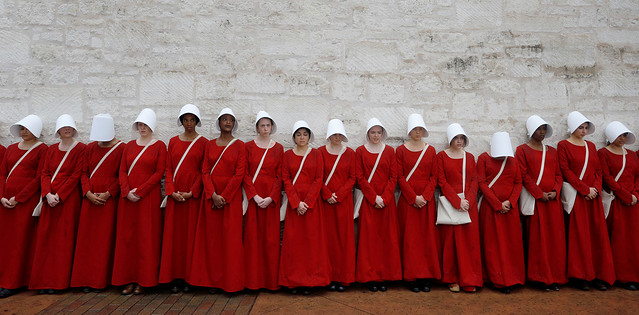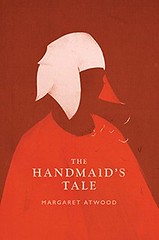You Can’t Read That! is a periodic post featuring banned book reviews and news roundups.

YCRT! News
Colorado school district pulls library copies of “Thirteen Reasons Why” over concerns it sensationalizes suicide, later reinstates the book.
This article, from the American Library Association’s Intellectual Freedom Blog, celebrates public library programs (in San Francisco, New York City, and elsewhere) featuring drag queens in costume reading books to children and sharing make-up and fashion tips. Wow, I don’t know about that. The whole concept sounds shovey-down-the-throaty to me, and I think many library patrons and parents will have a big problem with it.
Silly minorities, books are for and about white people. “The Absolutely True Diary of a Part-Time Indian” is challenged yet again, this time in Minnesota.
An interesting op-ed from the Toronto Sun: Forget ‘Cultural Appropriation’–It’s About Censorship.
The news roundup is deliberately short this time around. I’m leaving room for a review of the book everyone’s talking about these days, Margaret Atwood’s “The Handmaid’s Tale.”
YCRT! Banned Book Review
 The Handmaid’s Tale
The Handmaid’s Tale
Margaret Atwood
![]()
With the recent rightward shift in American government and the elevation of authoritarian Christians to positions of power in the president’s cabinet and personal staff, Margaret Atwood’s dystopian novel “The Handmaid’s Tale” is on many minds today. People are re-reading it; new readers are experiencing it for the first time; hundreds of thousands are watching Hulu’s TV adaptation. When Atwood makes public appearances, the first question she’s asked is “How close are we?”
Who can say? Atwood herself is reluctant to tackle that question. Still, “The Handmaid’s Tale” is convincing and believable. The society it describes doesn’t feel far-fetched. We know there are theocratic, woman-suppressing societies very much like it; we know there are some among us who would welcome it here.
As for the novel itself, it is highly readable. The unnamed narrator (her real name, that is, not her Handmaid name, which is Offred) is human and insightful. She can be caustic and occasionally funny. Along with clear-eyed descriptions of her present life in the commander’s household, she offers up memories of her former life: a college student, a free woman, later a wife and mother trying to stay under the radar as the theocrats take power and begin to clamp down. You want to infiltrate the alternate universe of the book and help her escape the clutches of Gilead.
How real was Winston Smith, in Orwell’s “1984”? How real were the characters in Huxley’s “Brave New World”? They were paper cutouts, there to populate hypothetical futures. Offred is real, contemporary, relatable. That the society she lives in is every bit as creepy and nightmarish as those of Orwell and Huxley is a bonus … Atwood can write a dystopian novel with the best of them, along with believable, relatable characters (as she demonstrates again in her recent MaddAddam trilogy).
My memory plays tricks. I thought I’d read “The Handmaid’s Tale” in college, but that was more than 15 years before it was published. Re-reading it now, I realize I’d finished only part of it before: the second half of the novel was new to me. Why did I read it again (or for the first time in full, take your pick)? For the same reasons as everyone else. It’s “truthy,” as Stephen Colbert would say; it offers a glimpse of what many on the religious right envision when they talk of making America great again. At the same time, it’s a novel of resistance: it inspires opposition to the forces that would restrict personal choice and freedom; essential reading for those who’ll fight to keep the hard-earned gains of recent decades.
And this: I read and review banned books for a periodic blog column titled “You Can’t Read That!” “The Handmaid’s Tale” has been challenged again and again, from its publication in 1985 to the present day, by those would ban it from public and school libraries, by those who do not want it taught to students in high school and even college. It consistently places on the American Library Association’s top 100 list of banned books, and with the renewed interest in the book (and now the Hulu TV adaptation) fresh challenges are popping up across the nation. If ever there was a timely choice for a review in my banned book column, “The Handmaid’s Tale” is it.
Challenges to “The Handmaid’s Tale” come primarily from parents who don’t want their children reading or discussing it in high school English classes. As with other controversial books on school reading lists, some parents simply want teachers to offer children alternative reading assignments; others want it taken off reading lists and removed from libraries so that no students can read it.
The ALA summarizes the most common objections cited in challenges to “The Handmaid’s Tale”: the inclusion of profane words; passages about sex; statements defamatory to minorities, god, women and the disabled; the book’s offensiveness to Christians; violence; hopelessness; moral corruption.
From the Parents Against Bad Books in Schools web site, here’s a description of one such challenge:
At a Fairfax County Public School Town Hall meeting on May 2, 2002 to discuss book selection a former FCPS teacher spoke about The Handmaid’s Tale. She spoke about the obscenities, masturbation, graphic violence, homosexuality, the use of drugs and alcohol, and abnormal sex in the book. She asked FCPS the following question: What are students in Fairfax County being inspired to do and to value by studying books like The Handmaid’s Tale?
From the ALA, here’s a description of another, more recent challenge:
The book was challenged for being “sexually explicit, violently graphic and morally corrupt,” according to the ALA’s annual roundup for Banned Books Week in 2013 and 2014, but was not ultimately removed from Page High School’s International Baccalaureate class. In Guilford, parents complained to members of the Board of Education that Atwood’s novel and Kurt Vonnegut’s Cat’s Cradle both “denigrate Christianity” and “tear down traditional values,” and circulated a petition to try to convince the district to change the curriculum.
I think the second challenge gets to the real issue, which is often unspoken. Parents who challenge the book, who want it banned, will count the number of dirty words and say it pushes a message of sex and violence; they’re less willing to admit to discomfort with the novel’s message. “The Handmaid’s Tale” describes a theocratic society in less than flattering terms, from the point of view of those it oppresses (women, in this case), with plenty of pokes at the hypocrisy of theocrats. The message is feminist, therefore liberal, therefore to be opposed. That is, I believe, what most of these challenges come down to, and is what they mean when they say the book is “offensive to Christians.”
Another Stephen Colbert quote comes to mind: “Reality has a well-known liberal bias.” People who challenge books that put their own conservative and religious fantasies to the test of real life fear the power of the written word. They fear novelists who, like Margaret Atwood, are articulate and insightful. They fear the power of “The Handmaid’s Tale.”
The challenges cited above, and others mentioned in the links below, were all overruled. “The Handmaid’s Tale” is still widely taught and studied across the USA and Canada. Still, only a fraction of challenges and attempts to ban the book are a matter of public record:
A recent survey by the National Coalition Against Censorship with the National Council of Teachers of English found that only seven percent of challenges get reported in the local press [and] three studies conducted in recent years—by the Oregon State Library, the Missouri School of Journalism and the Texas ACLU—… found that [only] three to 18 percent of challenges are reported.
We see only hints of the opposition to “The Handmaid’s Tale.” Offred saw only hints of what America was becoming … until she was swallowed up by Gilead. There won’t be any copies of this novel in the re-education camps, so you’d better read it now.
Links and references:
- Newsweek: Challenges and Bans Of “The Handmaid’s Tale” Aren’t Really Just about Sex or Profanity
- Washington Post: The Handmaid’s Tale Has Been Feared, Banned, and Loved. Now It’s Scaring the Bejeezus Out of Us Again.
- Comic Book Legal Defense Fund: The Handmaid’s Tale Under Attack in Oregon School
- Parents Against Bad Books In Schools:List of Challenged/Controversial Books by Title
- American Library Association: 100 Most Frequently Challenged Books by Decade